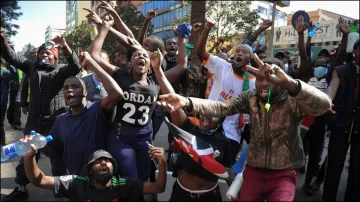Kenya's President William Ruto withdraws controversial tax bill after 23 killed in violent protests
Police opened fire on angry protesters as they stormed into the Parliament and set fire to several sections of the building on Tuesday. The controversial bill sought to add new taxes in the impoverished country reeling from several economic shocks after the COVID-19 pandemic.

Nairobi: Kenyan President William Ruto on Wednesday withdrew a controversial tax bill, a day after 23 people were killed in violent protests across the country following the bill's passage in the parliament. The development came as Kenyan protesters vowed to continue their demonstrations against new tax hikes that were set to be introduced by the bill.
Bowing to the pressure from protesters who stormed the parliament on Tuesday, Ruto said, "Listening keenly to the people of Kenya who have said loudly that they want nothing to do with this finance bill 2024, I concede. And therefore, I will not sign the 2024 finance bill, and it shall subsequently be withdrawn." Ruto said he would now start a dialogue with Kenyan youth, without going into details, and work on austerity measures.
The move will be seen as a major victory for a week-old protest movement that grew from online condemnations of tax increases into mass rallies demanding a political overhaul, in the most serious crisis of Ruto's two-year-old presidency. An outpouring of anger over tax increases leading to a nationwide protest movement plunged into chaos as protesters demanded Ruto's resignation.
23 killed as police open fire on protesters
Massive protests took place in 35 out of Kenya's 47 counties, including Ruto's homeland of Eldoret. Police opened fire on crowds who massed around parliament on Tuesday and later broke into the assembly's compound, minutes after lawmakers had voted through the contentious tax measures.
At least 23 people were killed across the East African country and another 30 were being treated for bullet wounds, the Kenya Medical Association said on Wednesday. Medical officials in Nairobi said hundreds had been injured in the unrest.
The third round of protests took place as lawmakers voted on the finance bill that would introduce new taxes, including an eco-levy that would raise the price of goods like sanitary towels and diapers. The protesters managed to overwhelm the police to entire the parliament shortly after a vote on the bill. Lawmakers fled through a tunnel, but protesters allowed opposition legislators who voted against the bill to walk out of the besieged building.
Auma Obama, a Kenyan activist and the half-sister of former US President Barack Obama, was among the protesters who were tear-gassed on Tuesday during the chaotic protests. Many called for Kenyan President William Ruto to quit office as well as voicing their opposition to the tax rises. In Nairobi, people chanted "Ruto must go" and crowds sang in Swahili: "All can be possible without Ruto".
India issued an urgent advisory for Indian nationals in Kenya, advising them to exercise utmost caution, restrict non-essential movement and avoid the areas affected by the protests and violence till the situation clears up.
Why were people protesting against the bill?
In the 2024/25 bill, the Kenyan government aims to raise $2.7 billion in additional taxes to reduce the budget deficit and state borrowing. Kenya's public debt stands at 68 per cent of GDP, higher than the 55 per cent of GDP recommended by the World Bank and the International Monetary Fund. Kenya had turned to the IMF after several economic challenges and the lender urged the government to meet revenue targets to access more funding.
The proposed measures that have triggered protests include new levies on basic commodities like bread, vegetable oil and sugar and a new motor vehicle circulation tax - pegged at 2.5 per cent of the value of a car to be paid annually. An "eco levy" on most manufactured goods including sanitary towels and diapers is also on the cards. The government has said the tax measures are necessary to fund development programmes and cut public debt.
What will happen after Ruto's decision?
Ruto's withdrawal of the controversial bill might avoid the immediate threat of more unrest as the demands of the protesters were finally met, but it still leaves the President between the demands of his impoverished citizens and global money lenders who have urged the lenders to cut deficits to obtain more fundings.
Protesters had earlier vowed to keep up their demonstrations in messages on social media using the hashtag #tupatanethursday, or "see you on Thursday" in a mix of Swahili and English. Posts on social media had urged people to occupy State House, the president's office and residence, on Thursday, and the local offices of the World Bank and the International Monetary Fund (IMF) on Friday. Heavily armed police patrolled the streets of the capital Nairobi, which were quieter than usual on Wednesday.
The protesters oppose tax rises in a country already reeling from a cost-of-living crisis, and many are also calling for President William Ruto to step down. Kenyans have been struggling to cope with several economic shocks caused by the lingering impact of the COVID-19 pandemic, the war in Ukraine, two consecutive years of droughts and depreciation of the currency.
(with inputs from Reuters)
ALSO READ | India issues urgent advisory as massive protests in Kenya turn chaotic over controversial finance bill